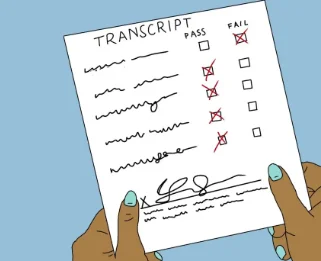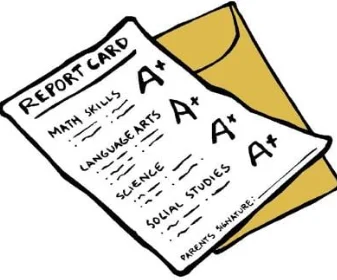Cases of students missing grades or getting undeserved scores are common in schools. Of late, it is not surprising to hear of the wrong scores.
It happens when a professor gives a student the wrong grade or a score in an exam or a course. In this post, we will guide you on how to deal with it as a student.
Imagine sitting for an exam after hours and hours of preparation and doing it well. Then, you end up with grades that do not match your preparation and expectations.
You might be angry and disappointed, but what do you do as a student? Here, we explore what to do when you find yourself in such a situation.
How to Deal When You Get a Wrong Grade

Here is what to do when you find out that your professor gave you the wrong grades and you are sure that you scored better.
The idea is not to complain but to raise the issue and help the lecturer see the mistake.
1. Follow the Institution’s Policy on such an Issue
Academic institutions normally have their policies on such matters as grade disputes, and this is normally found on the college’s website or the students’ handbook.
The student with a grade issue can then seek interpretation from the registrar so that when lodging a complaint, he or she is well informed.
The dispute might get to the level of being handled by a special committee or the dean of the faculty; therefore, knowing these policies will be crucial in determining your fate as far as changing of your grade is concerned.
2. Contact your TA if any
Most students interact with their teacher assistants-who always seem to be approachable and friendlier- more than their professors.
Students can see them as some sort of middlemen between them and their professors, and therefore, they can be helpful in such circumstances.
In most instances, professors do not always grade the exams, but instead, the work is left to the teacher assistant to work on.
This implies that your teacher assistant is more likely to know your academic ability better than your professor, and so is in a better position to help you change your grade or help you express your displeasure directly to the professor.
3. Talk to your Professor
In case you do not have a teacher assistant or his/her efforts have not borne fruit, you can get into direct contact with your professor.

In addition, you can send an email to him/her, but make it as polite as possible, maybe by beginning with greetings and then going to the inquiries.
Proceed to explain why you feel that you do not deserve the grade you were given in a humble but assertive way.
Another option is to meet your professor at a personal level and talk to him.
This should be a face-to-face meeting where you convince on your point as you are polite.
Do not get emotional but rather listen actively so as to have a positive conversation concerning the status of your grade.
This conversation must be done in a reasonable and respectful way so try as much as possible not to accuse your professor of any wrongdoing, even if it is truly the case.
4. Show that you are Concerned
Just show that you are really worried and concerned about it, and all you want is a disclosure of your performance. You can ask your professor the reason as to why you got the grade you are disputing in case there are no comments to justify the same.
Do not put on a defensive attitude but instead honestly seek to understand the grade in order to improve next time.
Seek to know where you did well and poorly and try to enquire what you can do so as to perform better.
In some scenarios, the professor might change the grade after getting clarification from you and your line of thought in case you provide justifications as to why your work was organized in a particular way with certain materials and evidence included.
5. Check the Feedback Provided by the Professor
The professor might have given you feedback on your work to justify your grade. Read through the comments to understand where the legitimate criticism of your work appears and put that into perspective.
Ensure you take note of issues such as an ‘unclear thesis’ or a need for citation. Also, check the lack of sufficient evidence, which might be the reason for you not attaining your desired grade.
Should there be no feedback and you are pretty sure that you did well, it then acts as a red flag that maybe your professor never went through your work.
Comments such as terrible conclusions might be an indicator that your professor was biased, thus your undeserved grade.
Of note is that you should be keen on the feedback and check whether it is constructive and whether you agree with it before you take further action.
6. Seek Opinions from College Advisors
A number of institutions do have college advisors, so if yours happens to be one, you can visit their offices and seek assistance.
The advisor will guide you on what the institutional policies permit as far as student action is concerned. Also, seeking such advice is important to know if the teacher failed you or not or if it was a mistake.
Since these problems are not a first in an institution, and you are not the first student to have such a problem, there must be a systematic protocol put in place to deal with such grave matters.
How to Report a Wrong Grade to the Prof or Dean

The best way to do this is to use the hierarchy that exists in the institution.
The moment you realize a problem in your grade your first contact will definitely be your teacher assistant or your professor.
If you fail to reach an agreement with either, you can contact the chairperson of your professor’s department.
However, before you take this step, make it clear to your professor the reasons why you have chosen that path.
The matter can then be forwarded to the dean in charge of academic affairs or up to the college principal, who can refer it to a special academic committee should the dispute prove difficult to resolve.
Keep in mind that this can culminate in a conference involving the three of you: You, your professor, and the dean in charge of your department so as to find a solution.
Since it can take a while, organize it as fast as possible after the unsuccessful meeting with your professor.
Prepare by having the necessary documentation, such as exam copies, the syllabus, and graded work by the professor.
These might help you when it comes to building a case and substantiating your claim. Since the professor has his/her documentation, too, step-by-step comparisons can be made.
In the unfortunate case where the professor does not respond or fails to act, consider forwarding the issue to the faculty head or the dean. In that process, check out the process of reporting your professor so that you do not mess things up.
Causes of Professors Giving Wrong Grades
When some elements of the grade are not included in the final grade or not recorded, you may end up getting the wrong grade.

During compilations, some areas, such as essays or take-away assignments, may be omitted. Such omissions may lead to low grades, and this might escape the attention of your professor.
In some cases, the professor might not have gone through your paper well enough, more so in terms of marking.
As earlier noted, failure to get feedback and comments about the exam by the professor might attest to this. However, this is a rare occurrence.
Finally, it can all boil down to a mix-up when posting the marks where the person keying in the marks can slip and post the wrong grade. To err is human.
Recent Cases of Students Getting Wrong Grades
Recent studies show that a significant number of students received the wrong grades in 2019. Almost half of the students at A level ended with different grades because the examiners were definitive in awarding the grades.
This means that the examiners agree on a student’s grade more so in essay-based subjects. However, this does not occur in subjective areas such as math and sciences.
There was a report in the UK that too many A-level grades in the UK are wrong and, hence, are highly unreliable. This is because of a regrading system meant to deal with top grades, which have become too common.
The most serious outcome of all these is that students tend to miss out on their preferred courses or opportunities due to low or wrong grades awarded.
They are either forced to redo the subject or think of a different course altogether that matches the lowered grade.
There have been suggestions that learners should be allowed to challenge their grades through an appeal system. The appeal works in the event that they are given the wrong grades.
Moreover, colleges are urged to have an option of differing the beginning of certain courses. This is done until appeals by students are complete.
What to do if a Professor Gives you a Higher Grade than you Deserve
Most institutions tend to impart integrity in their students in order to be on the safe side when such occur.
Students take their exams after preparing well, and therefore, they expect nothing short of high grades.
The professor can make errors when it comes to giving grades through wrong entries, calculations or mere oversight.
As a student with integrity, you should report a grade awarded undeservedly to you by the professor. Do this just like he/she would react when given low grades, though it is not as easy as it sounds.

